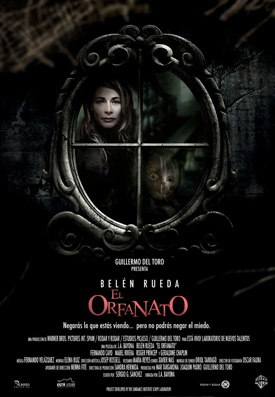 In a grand orphanage on the Spanish coat, dead children are playing games. Once a childhood resident, Laura (Belen Rueda) has returned as an adult. With her husband, she’s bought the old manse to turn it once more into a home for children. Her own adopted son, Simon, initially takes to the place, playing with his invisible friends and enjoying the beach. Then he meets Tomas, and The Orphanage reveals itself as a dark vision of…well, it’s rather dark, at least.
In a grand orphanage on the Spanish coat, dead children are playing games. Once a childhood resident, Laura (Belen Rueda) has returned as an adult. With her husband, she’s bought the old manse to turn it once more into a home for children. Her own adopted son, Simon, initially takes to the place, playing with his invisible friends and enjoying the beach. Then he meets Tomas, and The Orphanage reveals itself as a dark vision of…well, it’s rather dark, at least.
Simon (Roger Princep) disappears and Laura mounts a full-scale search for the boy. But there are complications. He’s ill, and requires medication. And noises in the house suggest a supernatural explanation, causing a rift between Laura and her practical doctor husband. There are other complications, too. A weird old woman arrives unannounced, seemingly presaging Simon’s disappearance. And a team of psychics and ghost hunters attempts to find the boy within the house’s confluence of timelines.
I had early concerns about the film’s trajectory. They were fully justified. Laura’s husband is barely present, popping in only when a counterpoint to her increasingly tattered psyche is wanted. Family dynamics: hamfisted. The tone lurches from family drama to ghost story to conventional gore thriller. When in the last mode, it complete with unexpected shocks like a character that jerks into shocking movement after death and two great, wholly unnecessary shots of a mangled jaw.
I questioned the plot’s logic at every turn. When her old orphan companions were all obviously handicapped in some way, why was the seemingly normal Laura at this orphanage? Why did those same orphans befall a certain fate? Why the Christ is an accessible hall closet full of disassembled scaffolding?
(Really serious spoilers to explain the above if you want to swipe: Simon disappears during a party to welcome the orphanage’s new handicapped children. The scaffolding is in a closet accessible to any of those kids, and would never have been there if it wasn’t a plot point. And the weird old woman turns out to be Thomas’s mom who, like Mrs Voorhees, killed the other orphans when they played a trick that resulted in Thomas’s death.)
Much more irritating: I was ahead of the movie within minutes. Early on, Simon shows his mother how the orphan ghosts have taught him a game of treasure hunting. She accompanies him on a hunt, then we have to wait through most of the film’s running time for her to realize that she might try using the same tricks to find her son. It’s not obvious to her, but as an audience it’s so maddeningly evident that I wanted to jump into the screen and lead the idiot around by the hand.
The middle act is where I found the most meat. There’s a segment that brilliantly recalls Poltergeist, where a medium and her support team set up cameras to capture whatever might happen when the medium regresses her perception to the orphanage as it once was. It’s incredibly tense and unnerving. As the medium, the excellent Geraldine Chaplin looks amazingly unnatural in Sony NightShot. There are also a handful of other bits with Tomas, who wears a very nasty looking sackcloth mask, and the threat of other ghost children that are quite good.
Guillermo del Toro’s name is on the credits as producer, which does more harm than good. Pan’s Labyrinth sets up an exacting standard for a film that wants to be both realistic and magical. That standard is almost impossible to uphold, and I was grading each scene in The Orphanage against Guillermo’s work. That’s wholly unfair, I quickly admit, but I found it impossible to stop.
By any standard, though, the film plays like a thinly conceived pastiche of classic elements: The Devil’s Backbone, Poltergeist, Peter Pan…feel free to pick a few more. I’ve got no problem, necessarily, with a horror film that rides on the achievement of others, but The Orphanage doesn’t have the gripping characters to wind all that homage around. I was bored as often as exhilarated, and more irritated than enthralled.